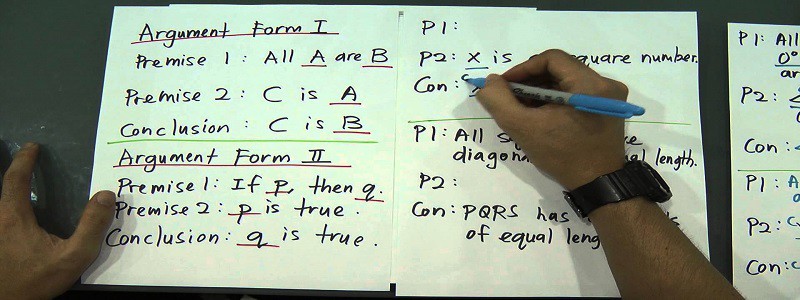Argumentation and the Elevation of Thinking and Reasoning in Mathematics Education
As part of a periodic series in The Debatifier on argument and math, today’s post backs up a step from Conor Cameron’s previous post on ‘Sometimes, Always, Never’ questioning in Algebra as a form of argument-making, and examines the broad and now well-established move in K-12 mathematics education toward thinking and reasoning skills at the base of mathematical formulas, procedures, and algorithms. The clear implication of this pedagogical direction is that students should be regularly engaging in argumentation in the classroom, as the articulation and performance of this thinking and reasoning.
Mathematics is constructed on a foundation of logical reasoning, and the National Council of the Teachers of Mathematics (NCTM) has been calling for an elevation of reasoning and argumentation in math education since at least 2000. Formal logic and the mathematical proof share an origin story, and the most influential figure in argument studies over the past 60 years, Stephen Toulmin (creator of the ‘Claim – Data/Evidence – Warrant/Reasoning’ argument model), had as his primary objective to expand the role and influence of informal logic.
Argument and Reasoning in Algebra: The Use of SAN Questions
By Conor Cameron
The Common Core State Standards demand that students of mathematics, “Construct viable arguments and critique the reasoning of others.” In a vacuum, that requirement probably seems more descriptive of what might occur in an English or social studies classroom. Many math teachers probably think to themselves, “Students may do that sort of work in their Geometry classes, not so much in mine.”
How Arguing Improves Students’ Reasoning Skills
by Hans Villarica, Education Writer
American educators agreed last year that argumentative reasoning should be taught in schools when those in most states adopted the new Common Core State Standards a state-led effort to establish educational benchmarks to prepare kindergarten through 12th grade students for college and career. Reaching a similar consensus on how to teach the art of arguing, however, hasn’t been as easy. But a new study published in the journal Psychological Science could offer a solution in the form of dialogue.
Argument Holds a ‘Special Place’ in the Common Core
by Gerald Graff
Since the Common Core State Standards are long and diffuse, not all readers notice the special emphasis they place on argument, far more than did any previous standards. Also easy to overlook is that the CCSS highlight the type of argument in which students engage with opposing views, evaluating “the strength and weaknesses of multiple perspectives” and anticipating “counterclaims in opposition to their own assertions.”





